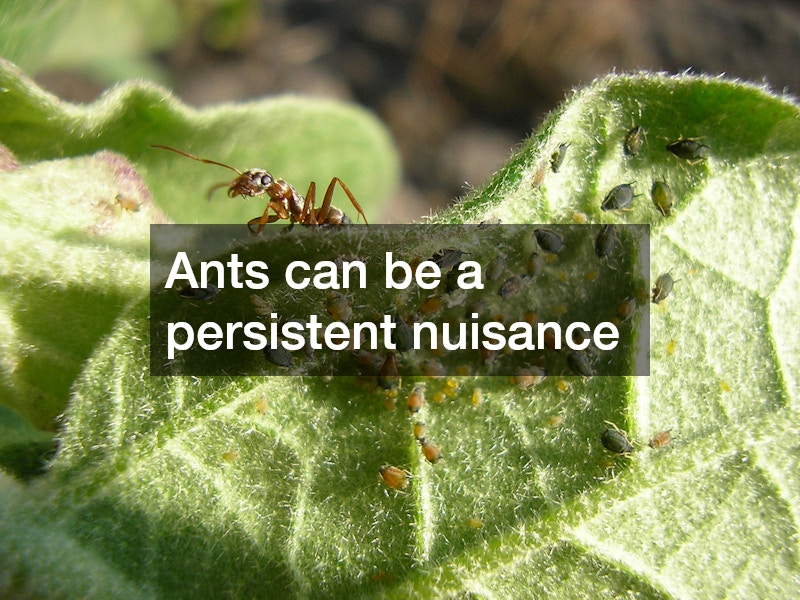Ant infestations can often feel like a never-ending battle, causing significant frustration as they invade our homes and outdoor spaces with surprising resilience. While their presence is often more than just a nuisance, figuring out the right time to seek professional help can be a challenge in itself. This article will explore the reasons ants are so challenging to eliminate, effective DIY methods to try before contacting experts, and when it truly is time to enlist a professional ant pest control service.
Why Are Ants So Hard to Eliminate?
Ants are incredibly difficult to eliminate due to their highly organized colony structure, which can extend far beyond what is visible to the naked eye. These colonies have a dynamic social system that allows them to adapt quickly to different conditions, making them resilient against many common elimination methods.
Additionally, their foraging habits, which involve leaving pheromone trails for others to follow, ensure that even if some ants are dealt with, others can quickly replace them from the colony.
Further complicating things, ants can have multiple queens in a single colony, allowing for the rapid propagation of new workers into an area where others have been eradicated. The close communication within an ant colony means that if part of the colony is disturbed, they can quickly relocate to a new, safer territory. Their ability to survive in various climates and conditions makes them adaptable invaders in both urban and rural environments, often thriving despite human efforts to control them.
The fact that ants can exploit almost any small crack or crevice to enter a structure makes defense lines challenging to maintain. Species such as carpenter ants can even cause structural damage as they tunnel through wood, underscoring the importance of understanding these pests’ habits to effectively manage their presence. It’s this combination of strategic living arrangements and complex social networks that allows ants to persistently survive and thrive in environments where other insects might fail.
What DIY Methods Can You Try Before Calling the Pros?
Before resorting to professional pest control, many homeowners attempt various DIY methods to manage ant infestations, starting with simple but effective natural remedies. One popular method includes using vinegar or lemon juice mixed with water to create a solution that disrupts the ants’ scent trails, deterring them from entering treated areas. Another method involves using commercial or homemade ant baits strategically placed near entry points, allowing ants to carry the poison back to their colony.
Prevention strategies are also crucial in managing ant problems before they turn into infestations. Ensuring that food crumbs or spills are promptly cleaned up and storing food in airtight containers can prevent ants from being attracted to the available food supply. Sealing cracks and crevices around windows, doors, and the foundation of your home will reduce entry points for ants, making it harder for them to find a way in.
Ultimately, the most effective DIY efforts involve a combination of remedies and prevention, as well as persistence. Regularly monitoring the home for potential ant trails and adjusting strategies as needed keeps small problems from escalating. However, if there is no noticeable improvement despite consistently applying these methods, it might indicate a larger infestation that requires professional attention. Using these strategies can be a cost-effective preliminary measure before seeking expert pest control services.
When Is It Time to Contact Professional Pest Control?
There are certain signs and situations where it becomes clear that professional pest control services are the best option for dealing with an ant infestation. One of the most obvious indicators is the persistence and recurrence of the infestation despite repeated DIY measures, suggesting the presence of a larger or hidden colony. Additionally, seeing large numbers of ants in several areas throughout the home, particularly during colder months, is a red flag that an extensive network may exist within the walls or foundation.
The discovery of different types of ants, each requiring specific control strategies, can also warrant expert intervention. For instance, carpenter ants, known for causing structural damage, or fire ants, which are aggressive and can pose risks to pets and children, might require a nuanced approach that professionals are best equipped to handle. Repeated attempts to eliminate these ants without success can exacerbate the problem if not addressed promptly by experts knowledgeable about the specific ant species in question.
Finally, if there are signs of structural damage to wood or unexplained damage around the home, it’s essential to call for a professional assessment. Pest control experts have access to specialized tools and treatments not available to the general public, increasing the chances of successfully eradicating the infestation. By choosing professional intervention, you ensure a thorough approach that can save homeowners from potentially costly repairs in the future.
While ants can be a persistent nuisance, understanding their behavior and adopting effective DIY methods can sometimes contain the problem. However, recognizing when the issue is beyond home remedies and seeking professional intervention is crucial for maintaining a comfortable and safe living environment. Ant infestations, though challenging, can be managed effectively by paying attention to signs, using preventive measures, and knowing when to rely on the expertise of pest control professionals.
.

